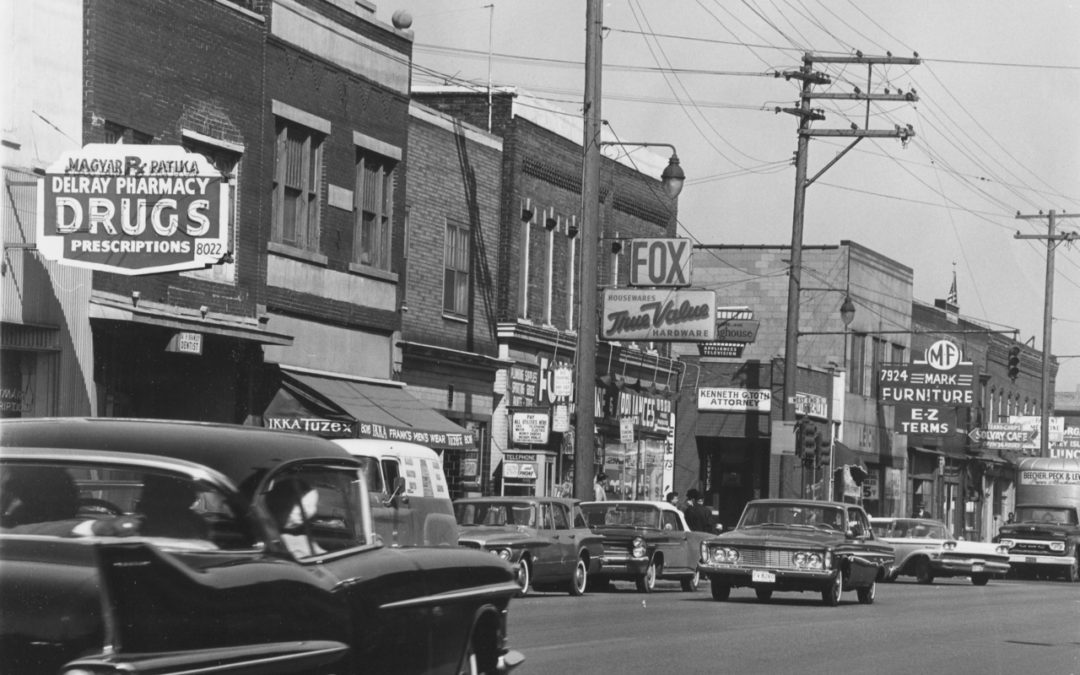There she was just a-walkin’ down the street, singin’ “Doo-wah-diddy diddy dum diddy do”
Snappin’ her fingers and shufflin’ her feet, singin’ “Doo-wah-diddy diddy dum diddy do” . . .
Now that I have that iconic Manfred Mann tune bouncing around in your head for the rest of the day, you are probably wondering where is he going with this one? Those repeating four syllables of the song’s refrain, as you have noticed, have been altered to fit the topic of this blog.
First, some background information about the contributors to our book Black and White Like You and Me:
- Thomas “Cookie” Marsh: 64 years
- Robert “Spider” Daniels: 59 years
- Thomas “Whitey” Daniels: 28 years
- Derek “D” Palm: 27 years
Add those years up and you will have the total number of years that we have lived in Detroit, Michigan. Together we have spent 178 years experiencing the good, bad, and ugly of the city from not only the viewpoint of black and white but also from different time periods and different sections of Detroit. We have witnessed Detroit from Rosedale Park, Grandmont Subdivision, Palmer Woods, the Lower East Side, Northeast Side, Southwest Side, Black Bottom, Northwest Side, and the Northend. (Learn more about the Neighborhoods of Detroit on Wikipedia.) You would be hard pressed to discover any other group of four people who would have this kind of first-hand knowledge about the Motor City.
Now back to the title: “Do”. Do they still live in Detroit? The only one is Cookie who lives in a beautiful home in Rosedale Park.
“Do”
Do they still live in Detroit? The only one is Cookie who lives in a beautiful home in Rosedale Park. Cookie is a “lifer.” He chose the University of Detroit over hundreds of other colleges to play basketball. He wanted to stay “home.” The city of Detroit is his home, the city that his Father migrated to in order to give Cookie and the entire family a better life. Those roots are too deep to pull.
“Would”
Would the other three move back to the city?
Spider was the last to leave about ten years ago. His wife Eva took a job at a hospital in Wyandotte which precipitated their move from Lane Street in Southwest Detroit to Trenton. Although Spider loved the city life and even though he was the self-proclaimed “Mayor of Lane Street”, circumstances with Eva’s work would have to change drastically for a return to the city. By the way, Eva is Hispanic and her roots are deep in the Mexican Town area of the city. Would Whitey return to the city? Despite a
Would Whitey return to the city? Despite a two year return in 2001-2002 due to his wife Joan’s employment by the City of Detroit which required residency, Tom and Joan moved out. Joan took on a new job which did not require living in Detroit, and Tom’s employment at Brother Rice in Bloomfield Township was too long a drive from where they lived at the River House on Jefferson. Would
Would D Palm return to the city? His absence began when his parents moved to Southfield just after he graduated from high school. Derek went to school and played basketball at Mercy College in Detroit. He lived sporadically in Detroit thereafter until he and his wife Tiwana raised their sons in a beautiful home in West Bloomfield. Even though the boys are grown men now, Derek plans on staying put.
“Did – he?”
Did he enjoy living in Detroit? With Cookie, he has taken the good with the bad. Despite a couple of break-ins to his home and having to be always vigilant when out and about, Cookie is as city as they come. He gained his reputation there, he met his wife Annette there, he raised his family there, and he is employed there.
With Cookie, he has taken the good with the bad. Despite a couple of break-ins to his home and having to be always vigilant when out and about, Cookie is as city as they come. He gained his reputation there, he met his wife Annette there, he raised his family there, and he is employed there.
Did Spider? As I said earlier, he was the mayor of Lane Street. He loved city life. He met his wife Eva there; he worked for a city school for thirty-three years there; he went to seventeen years of school there. His memories are long and deep with his beloved sports teams, favorite bars, and many friends. Did Whitey? I used to love it, playing sandlot baseball, going to Belle Isle, going to school, enjoying the bar and restaurants. I bought my first house there in 1973. When the kids got older, I moved to Royal Oak because of the schools. When we had to return in 2001, I was faced with some bitter truths. There were very little amenities such as grocery stores and shopping in general. We found ourselves going beyond the city limits for any services. I had a reverse racial discrimination incident on Belle Isle the day we closed on our residence in the River House. Did
Did Whitey? I used to love it, playing sandlot baseball, going to Belle Isle, going to school, enjoying the bar and restaurants. I bought my first house there in 1973. When the kids got older, I moved to Royal Oak because of the schools. When we had to return in 2001, I was faced with some bitter truths. There were very little amenities such as grocery stores and shopping in general. We found ourselves going beyond the city limits for any services. I had a reverse racial discrimination incident on Belle Isle the day we closed on our residence in the River House.
Did D Palm? Derek is an interesting cross-section of black and white cultures. He is comfortable in both settings due to his upbringing as discussed in our book. To this day, Derek goes to Detroit for haircuts and to socialize with some Detroiters. Derek gained his fame playing for Mercy College and many other teams in the city of Detroit. He was the first black man to play in the Detroit Lutomski League becoming the high scorer. Derek enjoyed his Detroit roots but has found that life in the suburbs suits him better.
“There they were just livin’ in Detroit singin’ Do-Would-Did–He, Do-Would-Did-He-Did-He-Do!”
Would you did he do?


